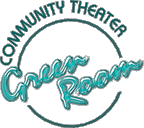|
||||||||||||||||||||||||||||||||||
|
|
OK, so you've perused the catalogs and ordered some plays that won't stretch the resources of your group to the breaking point. What do you look for while you're reading it? First of all, if you're an actor, take off your actor's hat. Too often we actors get enthusiastic about a play because there's a part in there that we'd kill to play, and we neglect to notice that while that one part is really well-written, the rest of it is awful, or the lighting requirements are impossible, or the subject matter is too banal or too controversial, or whatever. One good part does not make a show. Remember, you're trying to decide if this play is good for your group to do. Second, you have to read the WHOLE thing, not just the lines. This includes the cast of characters, author's notes, stage directions, everything. Start with the cast of characters, and read any descriptions the author might have provided. Do there seem to be any special requirements there - age range, foreign accents, physical attributes like great strength or a weight problem? Make note of those, especially any that might cause a problem, and move on to the setting. What is the locale? How is the room laid out? Any special set pieces needed? How many entrances and exits? Is there more than one floor? If there's a set diagram provided in the back, check it out, then try to imagine the set in your head - this will help you to visualize the action as you read. Read the play. As you read, notice any technical requirements, which are generally referred to in the stage directions. Be on the lookout for the following:
Notice how the dialog and stage directions advance the plot. With a good play, you should answer "yes" to the following questions:
Pay attention to the characters as well. If they're well written, you should answer "yes" to the following questions:
Read the play all the way to the end (including any stage directions that follow the last line of dialog). With a good play, you should be able to answer "yes" to the following:
To sum it up, ask yourself the following:
And finally, the most important question, unless you've got a generous funding source that doesn't rely on ticket sales:
|
|
||
The
Community Theater Green Room www.communitytheater.org © 1999 - 2002 Chris & Mike Polo All rights reserved. |


